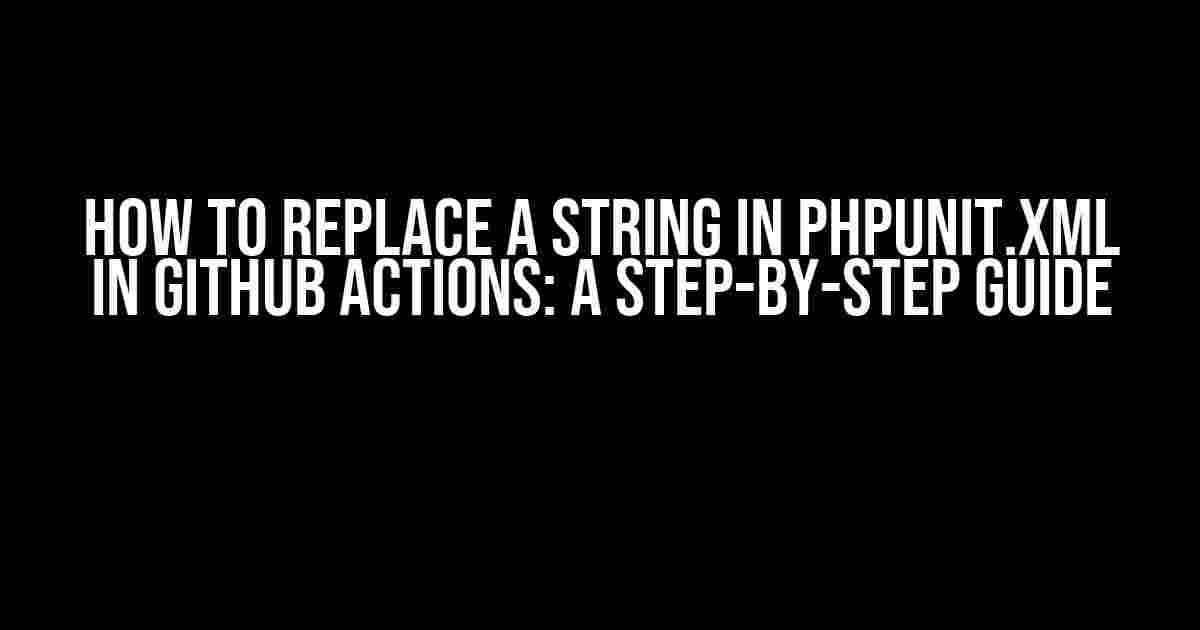Are you tired of manually updating your phpunit.xml file every time you want to run PHPUnit tests in your GitHub Actions pipeline? Do you dream of a world where you can effortlessly replace strings in your phpunit.xml file without breaking a sweat? Well, dream no more! In this article, we’ll take you on a thrilling adventure to replace a string in phpunit.xml in GitHub Actions. Buckle up, and let’s dive in!
Prerequisites
Before we embark on this quest, make sure you have the following:
- A GitHub repository with a PHPUnit test suite
- A phpunit.xml file in the root of your repository
- A basic understanding of GitHub Actions and YAML files
Step 1: Create a GitHub Actions Workflow File
Create a new file in your repository’s root directory called `.github/workflows/phpunit-testing.yml`. This file will contain the workflow configuration for running PHPUnit tests in GitHub Actions.
name: PHPUnit Testing
on:
push:
branches:
- main
jobs:
phpunit-testing:
runs-on: ubuntu-latest
steps:
- name: Checkout code
uses: actions/checkout@v2
# (we'll add more steps later)
Step 2: Install Dependencies and Run PHPUnit
In the same `phpunit-testing.yml` file, add the following steps to install your project’s dependencies and run PHPUnit:
- name: Install dependencies
run: composer install
- name: Run PHPUnit
run: vendor/bin/phpunit
Step 3: Replace the String in phpunit.xml
Now, let’s get to the good stuff! We’ll use the `sed` command to replace a string in our phpunit.xml file. Add the following step to your workflow file:
- name: Replace string in phpunit.xml
run: |
sed -i "s/old_string/new_string/g" phpunit.xml
In this example, we’re using `sed` to replace `old_string` with `new_string` in the `phpunit.xml` file. Make sure to update `old_string` and `new_string` with the actual values you want to replace.
How `sed` Works
If you’re new to `sed`, here’s a brief explanation of how it works:
| Option | Description |
|---|---|
| -i | Modifies the original file (in this case, phpunit.xml) |
| s/old_string/new_string/g | Searches for old_string and replaces it with new_string globally (i.e., all occurrences in the file) |
Putting it all Together
Here’s the complete `phpunit-testing.yml` file:
name: PHPUnit Testing
on:
push:
branches:
- main
jobs:
phpunit-testing:
runs-on: ubuntu-latest
steps:
- name: Checkout code
uses: actions/checkout@v2
- name: Install dependencies
run: composer install
- name: Replace string in phpunit.xml
run: |
sed -i "s/old_string/new_string/g" phpunit.xml
- name: Run PHPUnit
run: vendor/bin/phpunit
Testing Your Workflow
Commit and push your changes to trigger the GitHub Actions workflow. You should see the PHPUnit tests running successfully, with the replaced string in your phpunit.xml file.
Tips and Variations
Using Environment Variables
- name: Replace string in phpunit.xml
env:
OLD_STRING: ${{ secrets.OLD_STRING }}
NEW_STRING: ${{ secrets.NEW_STRING }}
run: |
sed -i "s/${OLD_STRING}/${NEW_STRING}/g" phpunit.xml
This way, you can store your sensitive data as secrets in your GitHub repository settings and use them in your workflow.
Using a Different Replacement Tool
If you’re not comfortable with `sed`, you can use other command-line tools like `perl` or `awk` to replace strings in your phpunit.xml file.
- name: Replace string in phpunit.xml
run: |
perl -pi -e "s/old_string/new_string/g" phpunit.xml
This example uses `perl` to replace the string, but you can experiment with other tools that fit your needs.
Conclusion
Congratulations! You’ve successfully replaced a string in your phpunit.xml file using GitHub Actions. With this newfound power, you can automate even more tasks in your testing pipeline. Remember to adapt this workflow to your specific needs and explore other creative ways to use `sed` and environment variables in your GitHub Actions workflows.
Happy automating!
Frequently Asked Questions
Got stuck while trying to replace a string in your phpunit.xml file in GitHub Actions? Don’t worry, we’ve got you covered! Check out these frequently asked questions and their answers to get you back on track!
Q1: How do I update phpunit.xml in GitHub Actions?
You can update phpunit.xml in GitHub Actions by using the `run` command in your `.yml` file. For example: `run: sed -i ‘s/old_string/new_string/g’ phpunit.xml`. This will replace `old_string` with `new_string` in your phpunit.xml file.
Q2: Can I use environment variables to replace strings in phpunit.xml?
Yes, you can! In your GitHub Actions `.yml` file, you can set an environment variable using `env` and then use it to replace a string in phpunit.xml. For example: `env: MY_VAR=”new_string” run: sed -i “s/old_string/${MY_VAR}/g” phpunit.xml`.
Q3: How do I escape special characters when replacing strings in phpunit.xml?
When replacing strings in phpunit.xml, you may need to escape special characters using a backslash (`\`). For example, if you want to replace a string that contains a forward slash (`/`), you would use `run: sed -i ‘s/old_string\/path/new_string\/path/g’ phpunit.xml`.
Q4: Can I use a separate file to store my replacement strings?
Yes, you can store your replacement strings in a separate file, such as a `.env` file, and then use it in your GitHub Actions `.yml` file. For example: `run: sed -i “s/old_string/$(cat .env | grep MY_VAR | cut -d(‘=’) -f2)/g” phpunit.xml`.
Q5: How do I confirm that the string replacement was successful?
After running the command to replace the string, you can use `cat` to print the contents of phpunit.xml to confirm that the replacement was successful. For example: `run: cat phpunit.xml | grep new_string`.


